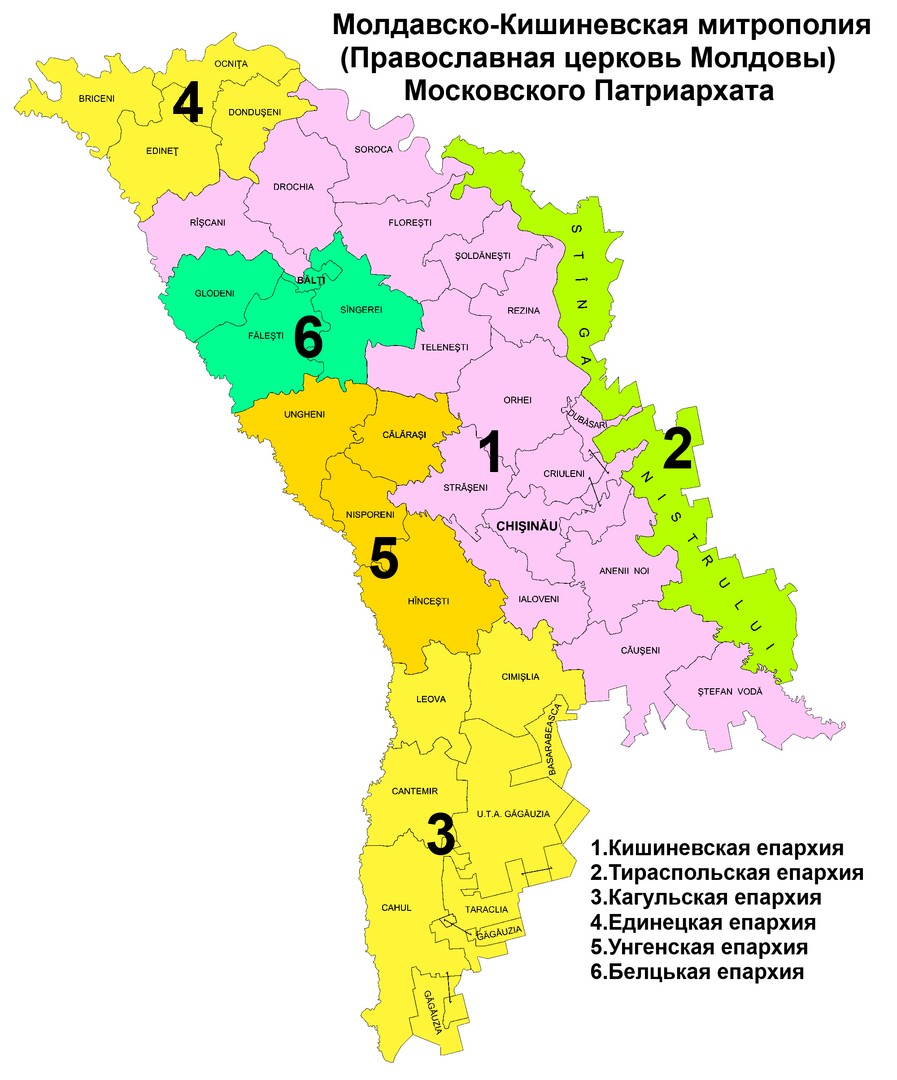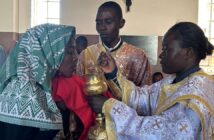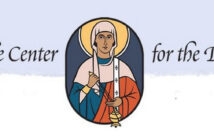Source: Peter Anderson, Seattle USA

Eparchies of the Metropolis of Chișinău and All Moldova
Metropolis of Chișinău and All Moldova. (2024, March 21). In Wikipedia. https://en.wikipedia.org/wiki/Metropolis_of_Chi%C8%99in%C4%83u_and_All_Moldova
By Закубанец – Own work, CC BY-SA 3.0, https://commons.wikimedia.org/w/index.php?curid=30190318
As previously reported, Metropolitan Vladimir of Chisinau and All Moldova wrote a surpisingly strong letter to Patriarch Kirill on September 5, 2023. (https://cubreacovblog.wordpress.com/2023/10/20/mitropolitul-vladimir-cantarean-ne-aflam-intr-o-situatie-de-faliment-institutional-mitropolia-basarabei-a-demonstrat-ca-este-o-forta-care-nu-mai-poate-fi-oprita/ ) The letter contained many grievances including the failure of the Holy Synod of the Moscow Patriarchate to elect Archimandrite Filaret (Kuzmin) as a bishop as requested by the Synod of the Orthodox Church of Moldova (OCM). Some people speculated that such a strong letter might be the first step in the OCM leaving the Moscow Patriarchate. The Moscow Patriarchate acted quickly. At its Synod meeting on October 11, 2023, Archimandrite Filaret was elected a bishop with the location of the episcopal ordination to be determined at the discretion of Patriarch Kirill. http://www.patriarchia.ru/db/text/6066199.html (Journal entry 97). The ordination was subsequently held in Chisinau — the first time in over 200 years that an episcopal ordination of the OCM occurred in Moldova. Recently, two more Moldovan bishops have been approved at the request of Metropolitan Vladimir. On March 12, 2024, the Moscow Synod elected Archimandrite Nicolae (Rosca) as the vicar of the Cahul diocese (Journal entry 17) and Archimandrite Patrocl (Porombac) as vicar of the Edinet diocese (Journal entry 18). http://www.patriarchia.ru/db/text/6109912.html In both cases, the locations of the episcopal ordinations were left at the discretion of Patriarch Kirill. On April 7, 2024, Archimandrite Nicolae was ordained in Chisinau by Metropolitan Vladimir with the participation of Metropolitan Vikenty of Tashkent and Uzbekistan. https://en.mitropolia.md/his-eminence-metropolitan-vladimir-primate-of-the-orthodox-church-of-moldova-officiated-the-ordination-of-archimandrite-nicolae-rosca-as-bishop/ On April 21, 2024, Archimandrite Patrocl was ordained by Metropolitan Vladimir, but with the participation of no bishops from outside Moldova. https://en.mitropolia.md/his-eminence-metropolitan-vladimir-primate-of-the-orthodox-church-of-moldova-led-the-ordination-as-bishop-of-archim-patrocl-porombac
On April 23, 2024, the Holy Synod of the OCM met and took a very important step in regard to establishing a new diocese in Moldova. The official minutes, which are in the Romanian language (the official state language of Moldova), can be read at https://mitropolia.md/hotararile-sinodului-bisericii-ortodoxe-din-moldova-din-23-aprilie-2024/. Journal entry 15 reads in part: “It was decided: 1. To establish the Diocese of Soroca and Drochia of the Orthodox Church of Moldova…. 2. To elect as titular bishop of the Diocese of Soroca and Drochia His Grace Ioan, Bishop of Soroca and Vicar of the Metropolis of Chisinau and all Moldova.” This was surprising as the Charter of the Russian Orthodox Churches provides as follows for “self-governing churches” such as the OCM: “Decisions on the formation or abolition of dioceses included in the Self-Governing Church and on the determination of their territorial boundaries are made by the Patriarch of Moscow and All Rus’ and the Holy Synod on the proposal of the Synod of the Self-Governing Church with subsequent approval by the Council of Bishops.” See Chapter XII, Section 8 of the Charter. Nevertheless, the official minutes in Romanian clearly provided that the Holy Synod of the OCU made the decision to form the new diocese. However, the Synod did not go so far as to make the bishop of the new diocese a “ruling” bishop, but only a “titular” bishop. The Press Service of the OCM’s Synodal Department for Church Relations with Society and the Media issued a press release about the decision in both Romanian and English. The title of the release in English reads as follows: “Diocese of Soroca and Drochia of the Orthodox Church of Moldova was founded.” https://en.mitropolia.md/diocese-of-soroca-and-drochia-of-the-orthodox-church-of-moldova-was-founded/ The release in Romanian has essentially the same language. This particular release was not issued in Russian.
And now comes the big surprise! In the Russian translation of the minutes, posted on the website of the OCM, the language for Journal entry 15 is completely different from the official Romanian entry. Instead of having only two numbered paragraphs, the Russian translation has five paragraphs. https://ru.mitropolia.md/%d0%b6%d1%83%d1%80%d0%bd%d0%b0%d0%bb%d1%8b-%d0%b7%d0%b0%d1%81%d0%b5%d0%b4%d0%b0%d0%bd%d0%b8%d1%8f-%d1%81%d0%b8%d0%bd%d0%be%d0%b4%d0%b0-%d0%bf%d1%80%d0%b0%d0%b2%d0%be%d1%81%d0%bb%d0%b0%d0%b2%d0%bd-3/ The first and fifth paragraphs read in part as follows: “DECIDED: 1. To support the initiative of His Eminence Metropolitan Vladimir of Chisinau and All Moldova to form the Soroca diocese ….5. His Eminence Metropolitan Vladimir of Chisinau and All Moldova will send a report to His Holiness Patriarch Kirill of Moscow and All Rus’ and the Holy Synod of the Russian Orthodox Church for approval of Journal No. 14 [actually it is No. 15]of the Synod of the Orthodox Church of Moldova on the formation of the Soroca diocese.” Is this a form of “double bookkeeping” – one version to be read in Moscow and another version to be read in Moldova, where 78% of the population use Romanian as their primary language?
I have also previously reported on certain events leading up to the June election of a new patriarch for the Bulgarian Orthodox Church (BOC). One step that must be taken before the June election is to fill the vacant metropolitan see of Sliven. This is an important step as the new metropolitan will be a member of the Holy Synod, which will prepare a “short list” of three metropolitans from which the Patriarchal Electoral Church Council will select the new patriarch. With respect to the selection of a new metropolitan, the BOC Charter provides that the Holy Synod will prepare a list of bishops to be considered by a Diocesan Electoral Council. The Council will then elect a “short list” of two bishops from which the Holy Synod will select the new metropolitan. At the meeting of the Sliven Diocesan Electoral Council, held on February 18, 2024, the Council elected a short list from a list of 12 bishops provided by the Holy Synod. In the first round of voting, the following three bishops received the most votes: Bishop Herotei (vicar of Sliven) received 26 votes, Bishop Arseniy (vicar of Plovdiv) 17, and Bishop Michael (vicar of Lovech) 11. As the recipient of the most votes, Bishop Herotei, the vicar bishop of Sliven and apparently the local favorite, became one of the two bishops on the short list. In the second round of voting to determine the second member on the short list, Michael received 22 votes while Arseniy kept his original 17 votes. The results of this February 18 election were challenged. It appears that one contention was that the voters were improperly influenced between the first and second rounds of voting. Supposedly, those who voted for Herotei in the first round were influenced to vote for Michael in the second round – not because he was the best candidate in the second-round race between Michael and Arseniy, but rather because it was clear that the Synod would never select Michael. With the final two candidates being Herotei and Michael, it would be certain that Herotei would be the next metropolitan of Sliven. This scheme in effect denied the Synod a meaningful choice and allowed the Electoral Council to determine who the successful candidate will be.
On February 24, the Holy Synod met and decided to void the election held on February 18. The Synod also adopted a “regulation” by a vote of 9 to 3. The nature of the regulation was not specified on the BOC’s website. https://dveri.bg/component/com_content/Itemid,100723/catid,14/id,73051/view,article/ It appears that the regulation provides that only the metropolitans would select a new metropolitan and that this would be done without the involvement of a diocesan electoral council. https://dveri.bg/component/com_content/Itemid,100723/catid,14/id,73052/view,article/ This regulation was a clear violation of the Charter of the BOC, and it caused a great public outcry. On March 12, the Synod met again and retreated. It was decided that the first election would be void, but that the new election would be held in accordance with the terms of the Charter with the participation of the Sliven Diocesan Electoral Council.
And now comes the second surprise! On April 22 the Holy Synod prepared a new list of candidates to be considered by the Sliven Diocesan Electoral Council in the rerun election. Unlike the February list which had twelve names, the new list has only six names, and neither Herotei nor Michael, the winners in the first election, are on the new list!! Anseniy is on the new list. This surprising event is reported at https://dveri.bg/component/com_content/Itemid,100723/catid,14/id,73253/view,article/. Perhaps the omission of the two winners of the February election is the Synod’s way of ensuring that what happened in the February election will not reoccur in the rerun election. However, it is bizarre that Heroei, the local favorite, is now ineligible. This latest action by the Synod has prompted protests in Sliven. In response, Bishop Herotei has addressed to the faithful of the Sliven Diocese an appeal urging peace and forgiveness. https://www.bta.bg/bg/news/bulgaria/661510-agatopolskiyat-episkop-yerotey-otpravi-obrashtenie-kam-miryanite-ot-slivenskata- The voting by the Sliven Diocesan Electoral Council for the rerun election is now scheduled for May 19 with the Holy Synod choosing the new metropolitan of Sliven on May 26.
In Ukraine, there is speculation that the voting of the full Rada with respect to the second reading of Draft Law 8371 is imminent. However, no date has yet been set. When and if the Draft Law will be considered by the full Rada is determined by the Rada’s Conciliation Council of Parliamentary Factions. As I previously reported, the Rada’s Committee on Humanitarian and Information Policy approved a very major revision of Draft Law 8371 on March 5, 2024. Now, almost two months later, the text of this March revision has not yet been made public and is not available on the Internet. On April 4, 2024, the Committee met and adopted more amendments to Draft Law 8371. The Committee’s minutes for that day can be read at https://kompkd.rada.gov.ua/uploads/documents/34905.pdf . The minutes show that a decision was made “[T]o take into account editorially the following amendments: number 314, 1175, 1180, 1183, 1188, 1193, 1216, 1217, 1220, 1234, 1236.” However, there is no way of knowing what these proposed amendments say or knowing what parts of these proposed amendments were adopted. With the minutes providing no help, one might expect that the transcript of the Committee’s meeting would provide a clue as to the substance of the amendments. It is logical that there would be some discussion of the substance of the amendments before the vote by the Committee members on the amendments. The verbatim transcript of the April 4 meeting can be read at https://kompkd.rada.gov.ua/uploads/documents/34870.pdf. The transcript shows that there was no discussion, but simply a motion, a roll call vote, and a unanimous adoption. Thus, the official documents give no information from which one can determine the language or substance of the amendments adopted on April 4. In my opinion this lack of information was probably intentional. The effect of withholding from the public the text of the amendments adopted on March 5 and on April 4 means that public criticism of the Draft Law is greatly inhibited. That result may well be the Committee’s hope and purpose in withholding the text. (The text of the March amendments was leaked to a few people, but the text is apparently nowhere available on the Internet. To the best of my knowledge, there have been no leaks of the April amendments.)
In other news, Patriarch Kirill has sent a letter to world religious leaders and international organizations concerning the actions now being taken against the UOC by the Ukrainian government. Although the entire letter has not been posted, an article was posted on April 27 on the Patriarch’s website concerning the letter. The article was in both Russian and Ukrainian. http://www.patriarchia.ru/db/text/6124407.html It is possible that the Ukrainian translation was made available immediately as part of an attempt to convince the faithful of the UOC that the Patriarch is their defender. Two highly regarded German theologians specializing in Eastern Europe have written an excellent statement defending Father Mykola Danylevych. The statement can be read in English at https://news.church.ua/2024/04/25/the-uoc-department-for-external-church-relations-has-published-a-statement-by-roman-catholic-theologians-from-germany-in-support-of-archpriest-mykolai-danylevych/?lang=en#2024-04-28 .
A blessed Holy Week to all who are observing Pascha on May 5!
Peter Anderson, Seattle USA
Centre St. Nicholas
Orthodox World News reports since 2011



